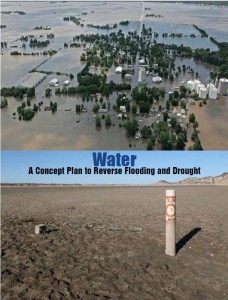
An incredible irony exists in the United States – one to which our government has turned a “blind eye.” Simply stated. . . at the same time that a large portion of our country suffers from consummate flooding, other portions of the country (often adjacent to each other), a periling drought consumes the landscape.
The scientific community and select members of our national government have initiated a dialogue with regard to the impacts of global warming and its consequences upon our nation. However, an even larger component of the government vociferously denies the very existence of global warming. Our current condition with regard to water is directly impacted by global weather patterns.
Over the years, our only approach to flooding seems to have been that we accept it and its consequences as irreversible, likewise with regard to drought. In generations past, our leaders have seen the wisdom of building enormous capital projects to control flooding – and it does. . . as far as the control of such facilities reaches. However, flooding occurs throughout the eastern half of the U.S. and drought prevails throughout the western half of the U.S. – to generalize.
This research delves into the possibility of simultaneously addressing each of these conditions by controlling flood waters and redirecting them to address the drought conditions. A national grid of water pipelines – not dissimilar to the Alaska Oil Pipeline (but smaller vessels) and laid out not unlike the National Defense and Interstate Highway System, could be used to store water within the system until needed, routed to lakes, reservoirs and other rivers to syphon off the potential for flooding or it can be routed westerly to create new farms lands out of land heretofore “unplantable” due to the lack of water or feed existing state growing regions such as the central valley of California and more.
The critical point to understand in reading this research is to realize that its purpose is to get elected officials, the technical community, and concerned citizens to talk. . . to realize that there is a conceivable means by which to deal with this devastating elements of nature. . . rather than just sit on our collective hands and wait for the next wave of problems to arise.
